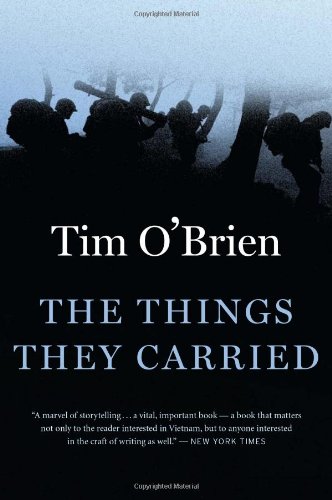
A classic work of American literature that has not stopped changing minds and lives since it burst onto the literary scene, The Things They Carried is a ground-breaking meditation on war, memory, imagination, and the redemptive power of storytelling. The Things They Carried depicts the men of Alpha Company: Jimmy Cross, Henry Dobbins, Rat Kiley, Mitchell Sanders, Norman Bowker, Kiowa, and the character Tim O’Brien, who has survived his tour in Vietnam to become a father and writer at the age of forty-three. Taught everywherefrom high school classrooms to graduate seminars in creative writingit has become required reading for any American and continues to challenge readers in their perceptions of fact and fiction, war and peace, courage and fear and longing.
“They carried all the emotional baggage of men who might die. Grief, terror, love, longing–these were intangibles, but the intangibles had their own mass and specific gravity, they had tangible weight. They carried shameful memories. They carried the common secret of cowardice…. Men killed, and died, because they were embarrassed not to.”
A finalist for both the 1990 Pulitzer Prize and the National Book Critics Circle Award, The Things They Carried marks a subtle but definitive line of demarcation between Tim O’Brien’s earlier works about Vietnam, the memoir If I Die in a Combat Zone and the fictional Going After Cacciato, and this sly, almost hallucinatory book that is neither memoir nor novel nor collection of short stories but rather an artful combination of all three. Vietnam is still O’Brien’s theme, but in this book he seems less interested in the war itself than in the myriad different perspectives from which he depicts it. Whereas Going After Cacciato played with reality, The Things They Carried plays with truth. The narrator of most of these stories is “Tim”; yet O’Brien freely admits that many of the events he chronicles in this collection never really happened. He never killed a man as “Tim” does in “The Man I Killed,” and unlike Tim in “Ambush,” he has no daughter named Kathleen. But just because a thing never happened doesn’t make it any less true. In “On the Rainy River,” the character Tim O’Brien responds to his draft notice by driving north, to the Canadian border where he spends six days in a deserted lodge in the company of an old man named Elroy while he wrestles with the choice between dodging the draft or going to war. The real Tim O’Brien never drove north, never found himself in a fishing boat 20 yards off the Canadian shore with a decision to make. The real Tim O’Brien quietly boarded the bus to Sioux Falls and was inducted into the United States Army. But the truth of “On the Rainy River” lies not in facts but in the genuineness of the experience it depicts: both Tims went to a war they didn’t believe in; both considered themselves cowards for doing so. Every story in The Things They Carried speaks another truth that Tim O’Brien learned in Vietnam; it is this blurred line between truth and reality, fact and fiction, that makes his book unforgettable. –Alix Wilber




